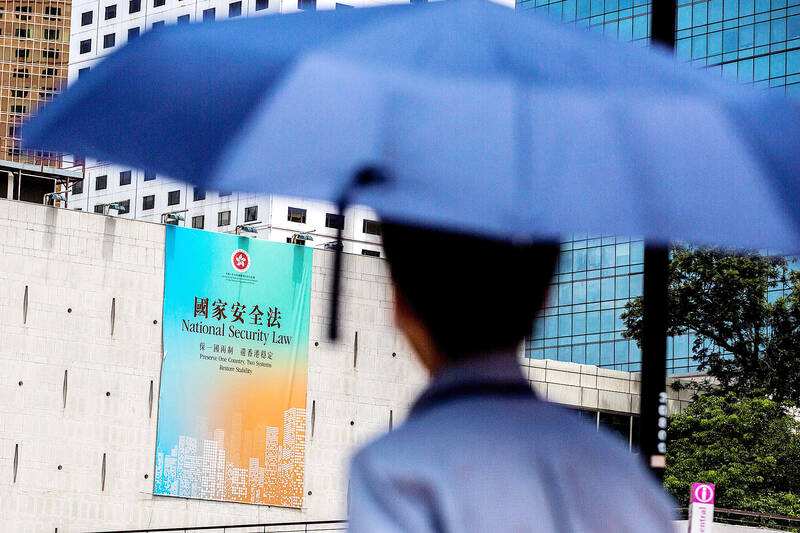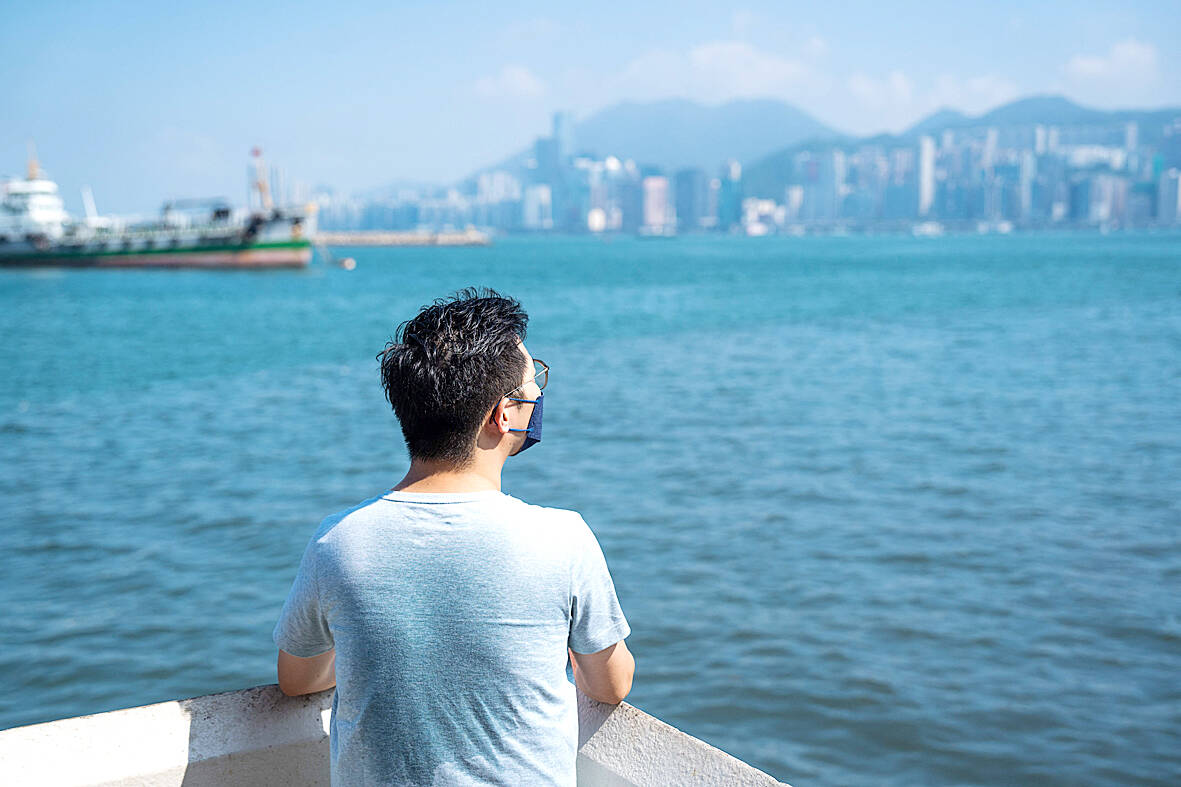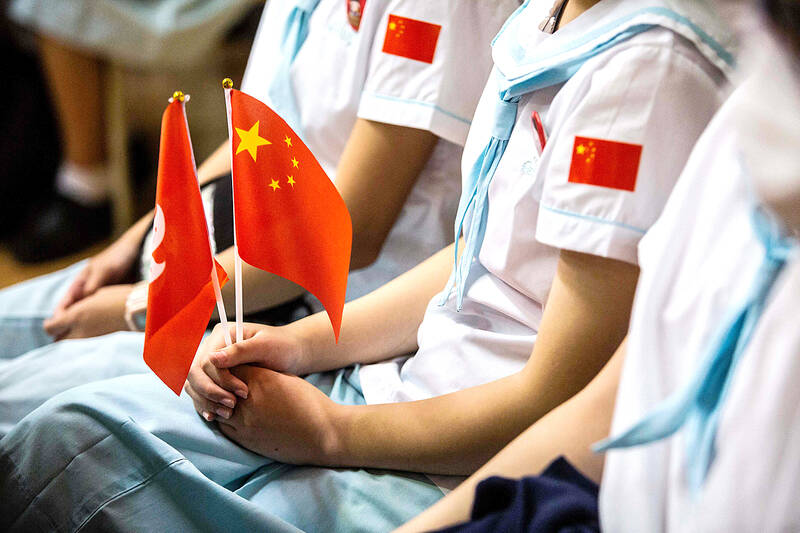As Hong Kong students return for the new academic year, veteran teacher Wong is counting down the days until the political maelstrom sweeping the city leaves him no choice but to quit.
Wong, 34, fears he will soon join the exodus of teachers and students triggered by Beijing’s tightening grip on Hong Kong, which has started transforming local schools, according to multiple educators.
The latest government figures show more than 4,000 teachers left their jobs in the past school year, a five-year high and a 70 percent spike from the year before.

Photo: AFP
“I have no faith in the future of Hong Kong or that of the industry. It is hard to nurture a person in this environment,” Wong, who asked to use just his surname, said.
The political crackdown has coincided with the coronavirus pandemic, during which Hong Kong has kept strict zero-COVID rules that have fueled further departures. Students have pulled out of school in droves, with 30,000 fewer attending primary and secondary school in September last year compared to the preceding October.
Wong, who has taught for more than a decade, said five teenagers from his class of 32 withdrew halfway through a term to emigrate.

Photo: AFP
“The students are leaving not because they dislike the school, but because of Hong Kong’s environment.”
PATRIOTIC CLASSROOMS
China is remolding once outspoken Hong Kong in its own authoritarian image, following massive and sometimes violent democracy protests in 2019 in which youngsters played a key part.

Photo: AFP
Teachers have since been ordered to instil patriotism in students and comply with a Beijing-imposed national security law that has criminalized much dissent.
Curriculum are being tweaked to align more closely with Chinese Communist Party ideology.
Earlier this month teachers were told to “study and learn the key messages” of a recent speech by President Xi Jinping (習近平).
Students and parents have also been encouraged to report teachers who might be breaching the security law. Wong received a letter of reprimand from Hong Kong’s Education Bureau last year after his teaching materials analysing the pros and cons of civil disobedience drew anonymous complaints.
“It shattered the trust that was fundamental to teaching,” he recalled.
Between 2019 and last year, Hong Kong authorities received 344 complaints against teachers in relation to the democracy protests, with 55 percent of cases found to be substantiated.
One high-school principal said he would instruct staff to keep their heads down and comply with government guidelines to the letter.
“Everyone is being very careful ... If some (teaching materials) may touch on political sensitivities, then we’ll skirt around it,” said the principal, who requested anonymity. “Nobody wants trouble and the teachers don’t want to be held personally responsible.”
LOWER STANDARDS?
Authorities have rejected the idea of an emigration wave and argue teachers choose to leave their posts for various reasons, including retirement and further study.
Hong Kong’s education chief said schools were generally operating smoothly and there were enough qualified teachers despite a “slightly higher” attrition rate.
But a recent survey of 140 schools showed each institution on average lost 32 students and seven teachers over the past year.
Newspaper Ming Pao surveyed its classified section and found at least 200 schools were still looking for teachers in late July. In previous years most vacancies would be filled by the end of May.
Administrators say some schools have been forced to hire less-qualified candidates.
Schools are also competing to poach students, as their headcount often determines their government subsidies and protects against closure.
And education is not the only sector affected by brain drain. The city’s labor force has dropped about six percent since 2018 to 3.75 million people, according to the latest official figures, the lowest number in nearly a decade.
A new generation of Hong Kong teachers are now weighing options and assessing risks that come with their careers.
University graduate Mak, 23, has spent a year teaching English at a secondary school even though he does not have a teacher’s diploma — a fact his employer did not seem to mind.
“I’ll continue teaching for the next few years, but not necessarily in the long term,” he said.
Mak feels he has little control over what happens to his profession.
“There’s not much that can be changed,” he sighed. “You either submit, or quit.”

April 14 to April 20 In March 1947, Sising Katadrepan urged the government to drop the “high mountain people” (高山族) designation for Indigenous Taiwanese and refer to them as “Taiwan people” (台灣族). He considered the term derogatory, arguing that it made them sound like animals. The Taiwan Provincial Government agreed to stop using the term, stating that Indigenous Taiwanese suffered all sorts of discrimination and oppression under the Japanese and were forced to live in the mountains as outsiders to society. Now, under the new regime, they would be seen as equals, thus they should be henceforth

Last week, the the National Immigration Agency (NIA) told the legislature that more than 10,000 naturalized Taiwanese citizens from the People’s Republic of China (PRC) risked having their citizenship revoked if they failed to provide proof that they had renounced their Chinese household registration within the next three months. Renunciation is required under the Act Governing Relations Between the People of the Taiwan Area and the Mainland Area (臺灣地區與大陸地區人民關係條例), as amended in 2004, though it was only a legal requirement after 2000. Prior to that, it had been only an administrative requirement since the Nationality Act (國籍法) was established in

With over 80 works on display, this is Louise Bourgeois’ first solo show in Taiwan. Visitors are invited to traverse her world of love and hate, vengeance and acceptance, trauma and reconciliation. Dominating the entrance, the nine-foot-tall Crouching Spider (2003) greets visitors. The creature looms behind the glass facade, symbolic protector and gatekeeper to the intimate journey ahead. Bourgeois, best known for her giant spider sculptures, is one of the most influential artist of the twentieth century. Blending vulnerability and defiance through themes of sexuality, trauma and identity, her work reshaped the landscape of contemporary art with fearless honesty. “People are influenced by

Three big changes have transformed the landscape of Taiwan’s local patronage factions: Increasing Democratic Progressive Party (DPP) involvement, rising new factions and the Chinese Nationalist Party’s (KMT) significantly weakened control. GREEN FACTIONS It is said that “south of the Zhuoshui River (濁水溪), there is no blue-green divide,” meaning that from Yunlin County south there is no difference between KMT and DPP politicians. This is not always true, but there is more than a grain of truth to it. Traditionally, DPP factions are viewed as national entities, with their primary function to secure plum positions in the party and government. This is not unusual